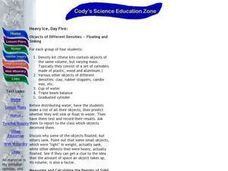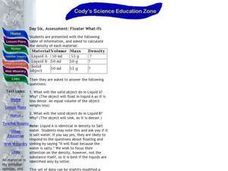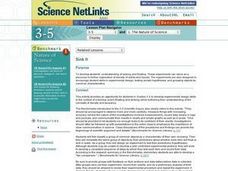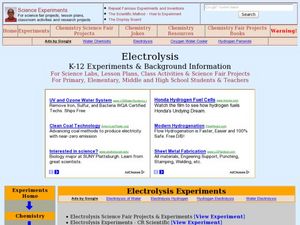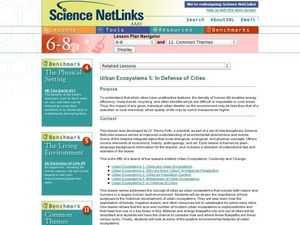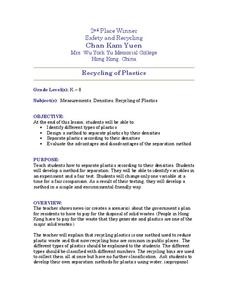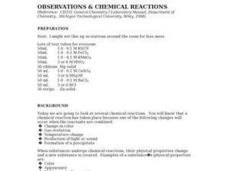Curated OER
Applied Science - Physics Pre-Lab
Students observe fluid motion. In this Physics lesson, students explore the principles of Pascal, Archimedes, and Bernoulli. Students list their experiences with fluid movement.
American Chemical Society
Air, It's Really There
Love is in the air? Wrong — nitrogen, oxygen, and carbon dioxide are in the air. The final lesson in the series of five covers the impact of temperature on gases. Scholars view a demonstration of gas as a type of matter before performing...
Curated OER
Heavy Ice: Day Five
Students explore physics by conducting a class experiment. In this density lesson plan, students examine a list of items and discuss whether they will sink or float and then determine their density. Students examine the objects over five...
Curated OER
Motion in Fluids
Students explore physical science by participating in a science activity. In this liquids lesson, students discuss how fluids can be affected by motion unlike solids. Students define other scientific vocabulary terms and conduct a motion...
Curated OER
Day Six: Floater What Ifs
Students observe earth science by examining results from an experiment. In this buoyancy instructional activity, students practice floating different items in two different liquids and identify why certain objects will float and others...
Curated OER
Sink It
Introduce your class to the concept of sinking and floating. In groups, they classify objects after making predictions about which materials will sink or float. They record their results and create graphs and charts to share with the class.
Curated OER
Seashore Explorers
There are three separate lessons within this resource that can be used together, or that can each stand alone. In the first, five simple activities allow junior scientists to examine the amazing properties of water. In the second, they...
Curated OER
Electrolysis
Students conduct a series of experiments on water electrolysis. In this chemistry lesson, students explain what happens to the molecules during the process. They cite real world applications of electrolysis.
Curated OER
Dry Ice: Simply Sublime
A fascinating instructional activity on states of matter is here for your young scientists. Dry ice is used to challenge learners preconceived notions about how solids work. They discover all sorts of interesting facts about states of...
Curated OER
Sea Water Freeze
Students observe how salinity affects the time it takes water to freeze. They participate in an experiment to determine that ice is essentially salt-free whether formed from fresh or salt water
Curated OER
Water and Ice
Young scholars investigate what happens to solids and liquids when they change from one form to another. The amount od space taken by frozen water begins the discussion and students are led to formulate their own hypothesis to research.
Curated OER
Water and Ice
Learners explore the states of matter. In this physical science lesson, students observe what happens to water when it freezes and record observations. Learners then observe ice when it melts and record observations.
Curated OER
Recycling of Plastics
Students separate plastics according to their densities, develop a method for separation and identify variables in an experiment and a fair test, changing only one variable at a time for a fair comparison. After testing, they develop a...
Curated OER
The Sun as the Driving Force of the Water Cycle
Students study the water cycle and how the sun is an important factor. In this water cycle lesson plan students investigate how to desalinate water and explore the different densities of fresh versus saltwater.
Curated OER
Magnetorheological Fluids
Students conduct a series of experiments on magnetorheological fluids. In this physics lesson, students explain how these fluids behave in varying magnetic field strength. They give practical applications of magnetorheological fluids.
Curated OER
Evidence of Chemical Change
In this chemical change worksheet, students conduct 4 experiments set up around the room. They follow the instructions at each station for each experiment and list the physical properties and observe any changes at each station. Students...
Curated OER
Force and Motion
Students experiment with force and motion. For this force and motion lesson, students test gravity using a variety of objects. Students rotate through a series of stations which use force, motion, friction, and inclines. Students predict...
Curated OER
Volumw Measurement, English System
Eighth graders biew each volume container and discuss where they have seen them in their home, and how they have seen them used. They explore the different names of volume sizes and their equivalents towards one another. Students...
Curated OER
Earth Science: The Structure of the Earth
Students identify and complete activities about the structure of the Earth. For this Earth structure lesson, students view a Powerpoint about the Earth's layers and complete a diagram. students compare temperatures in the Earth's layers...
Curated OER
Project Geode
Students predict the appearance of a geode's internal structure based on its mass and density. They form a hypothesis based on the data they collect. They also identify common minerals found in Illinois.
Curated OER
Shake, Rattle and Roll
Students compare the weathering of materials. in this weathering lesson, students experiment with the chemical and physical weathering of different materials. Students use salt and water as an example of how weathering occurs.
Curated OER
Effects of the Southern Pacific Railroad Causeway
Fifth graders describe the appearance of a substance before and after a physical change. They re-create the Southern Pacific Railroad Causeway across the Great Salt Lake. They determine for themselves how the water is exchanged...
Curated OER
Observations & Chemical Reactions
Students conduct a series of experiments in which they explore chemical reactions. They detect chemical changes by observing how physical properties change when two different chemicals are combined. They list and describe the reactants...
Curated OER
Hot Gas Or Cold Gas Lab
Students engage in a lab project to study chemical reactions. They use guided questions to help facilitate the lab experience and come to the correct outcomes. The lesson plan does not contain a true understandable objective. The lesson...


